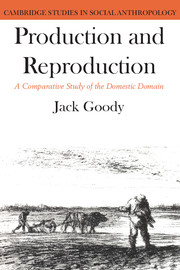Book contents
- Frontmatter
- Contents
- Tables
- Figures
- Preface
- Acknowledgements
- 1 The evolution of the domestic economy: the hoe and the plough
- 2 The theory, the variables and a test
- 3 Making causal inferences
- 4 Farming, labour and sex
- 5 Concubines and co-wives: the structure of roles in Africa and Eurasia
- 6 Adoption in cross-cultural perspective
- 7 Strategies of heirship
- 8 Class and marriage
- 9 Retrospect
- Appendix 1 Tables
- Appendix 2 The probability of family distributions
- Notes
- References
- Index
1 - The evolution of the domestic economy: the hoe and the plough
Published online by Cambridge University Press: 05 June 2012
- Frontmatter
- Contents
- Tables
- Figures
- Preface
- Acknowledgements
- 1 The evolution of the domestic economy: the hoe and the plough
- 2 The theory, the variables and a test
- 3 Making causal inferences
- 4 Farming, labour and sex
- 5 Concubines and co-wives: the structure of roles in Africa and Eurasia
- 6 Adoption in cross-cultural perspective
- 7 Strategies of heirship
- 8 Class and marriage
- 9 Retrospect
- Appendix 1 Tables
- Appendix 2 The probability of family distributions
- Notes
- References
- Index
Summary
Just over 100 years ago, Edinburgh was the location of a series of important developments in the field of comparative sociology. Much of this activity centred around the publishing house of Black, the production of the Encyclopedia Britannica and around certain literary societies. One of the leading figures in this intellectual movement was the Cambridge-trained lawyer, J. F. McLennan (1827–81). One of the men he influenced was W. Robertson Smith who also belonged to ‘The Edinburgh Evening Club’, described as a newly formed talking shop. Indirectly, he influenced another Scot, Sir James Frazer, for Robertson Smith became a fellow member of Trinity College, Cambridge, when he had to abandon his academic career in Scotland.
McLennan's interest in anthropology and sociology emerges in his very first publication, an article on ‘Law’ for the 8th edition of the Encyclopedia (1857). Like other jurists of the time, and like the Scottish philosophers of the previous century, his intellect was engaged by the problems of the long-term development of social institutions. In the early section of this very sociological essay, McLennan deals with the growth of law and the origin of society: ‘Society’, he writes, ‘obviously commences in the family … the state where the government is patriarchal is indeed the direct prolongation of the family’ (255–6), a proposition he was later to question. Early society deals with personal safety, property, marriage (in Anglo-Saxon the word for law is the same as that for marriage) and government.
- Type
- Chapter
- Information
- Production and ReproductionA Comparative Study of the Domestic Domain, pp. 1 - 8Publisher: Cambridge University PressPrint publication year: 1977

